高中英语必修二全套教案(北师大版)教学内容
北师大版英语高中必修二教案

Unit4 Communication Workshop参考教案Teaching objective:To write sentences with the help of an internet pageTo listen to a song and extract important wordsTo listen to a radio programme for main factsResources used: cassette, slideTeaching difficulties: write sentences with the help of an internet page Teaching procedures:Ⅰ. Warming upAsk students what they already know abut Sydney—encourage them to say as much as possible.Then give them some information, such as:3. 9 million, Chinatown, Sydney Harbor Bridge, seaside city, surfing, Sydney Tower, official created a city. Fill the blanks with these informationⅡ WritingUse your notes to write key sentences for each paragraph about your area.For example:Sydney is a modern city located in South –eastern coast of Australia.The teacher gives students five minutes to do the exercise. Then ask students read out their sentences. After this, the teacher may show students these model sentences.1. It is known to all that Sydney Opera House has become a symbol of Sydney.2. Darling Harbor also attracts a lot of tourists as well.3. Sydney, official created a city, which has a population of 3.9 million was founded in 1788/1842.4. Sydney is a paradise of sailing, every year a great many come here for the sport.5. Sailing is not the only thing you can do in Sydney, which is also home to surfing, one of the most challenging sports.Ⅲ PracticePractise writing sentence describing a famous cityRio de Janeiro (里约热内卢)1. introduction:Population: A city where 11 million people /Brazil’s second largest city Located: west coast of the Atlantic Ocean2. Things to see:Entertainment: Carnival(狂欢节)Do not miss this great party /enjoy samba Places to visit: modern malls/ theme parks/Copacabana--princess of the Sea 3. Things to do:go swimming /go shopping/Copacabana beachwrite composition according to the informationⅣ Listening①Ask students what words they would expect in a song called “The TelephoneCall”②Students read the seven sentences and guess what the missing words mightbe③Play the tape for students to complete the sentences.Ⅴ Speaking①Students look at the pictures and discuss in pairs about the scientific experiments that have ever been done in space②Students read the questions and in pairs, guess what the answers are.③Listen to the tape and see whether your answers are right.Do the exercise stage 2 and stage 3Ⅵ HomeworkDo the exercise page 62Unit4 Lesson 1参考教案Tomorrow’s WorldTeaching objectives:To use the title of a text to predict the content.To practise using vocabulary of cyberspace.To practise using will and going to to talk and write about the future.Teaching difficulties: To revise Present Simple and Present Continuous.Teaching Aids: computer and cassetteTeaching procedures:Ⅰ. Warming upWhat computers and internet bring us?convenient, high efficientCompared to 20 years ago how do you think technology will change our lives?For example:Go shopping on line.Needn’t carry cash and use cre dit cards.Instead of going to the bank you can use a computer and a telephone to pay for bills.1. Imagine what happens in the next twenty years?2. Is it possible that the computer gives us disaster?Look at the title of the article.Which of these topics do you think it will mention?* the Internet * artificial human * time travel * robots * global warming * virtual reality Read the article quickly and check your guess to question 2 above.1.With the development of computers, our life may change in shopping andcommunicating ways2.The text infers to us that worry is not necessary and computers and the Internet onlydo good to us.3.Some experts say in the future we will not go to school in the classroom like us.4. In the future it is possible that people live in another world of outer space.5. The text tell us you can do many things but needn’t go to the place yourself.6. Because of the rapid development of Internet television and the mail will be replaced by computer.Keys: T F T F T TLearning vocabularyMatch the vocabulary from the text below with the definitions.hacker, chaos, terrorist, the Net (Internet), virtual reality, crash1. a person who enters other people’s computer programmes in secret2. The use of computers to make situations feel and look real.3. have an accident by violently hitting something.4. some who does terrible things to harm countries, governments and people.5. computer system that allows millions of people around the world to share information6. A terrible situation in which everything goes wrongKeys: 1. hacker 2. virtual reality 3. crash 4. terrorist 5. the Net (Internet) 6. chaos Correct error1.In the last thirty years, the Internet grew rapidly.2. Terrorist may “attack” the world’s computers, cause chaos, make planes and trains crash.3. It is convenient to order tickets from the internet.4. In 1983, there were only 200 computers connect to the Internet.5. It is clear we can use internet to do all kinds of things at home.6. Personally, I’m optimistic abo ut the future of internet.7. As society develops, computers will make our life much convenient.8. The mail service may also disappear as the increasing use of e-mail.Keys: 1. grew 改为has grown 2. make前加and 3. order 改为book 4. connect改为connected 5. clear后加that 6. of 后加the 7. much 改为more 8. as 改为with We can feel convenient, we can do all kinds of things from the Internet at home, such as buy books, find out about holiday offers, book tickets and so on.Some traditional things will disappear.We may live in a virtual world.Hacker can get into the computers of banks and government so that change data or steal away important information.Terrorists will attack the world’s computers, cause chaos, make planes and trains crash even and cause nuclear war.Voice your opinionDo you feel pessimistic or optimistic about the future of the Internet? Why?Language points1.In 1983, there were only 200 computers connected to the Internet.= which were connected to the Internet.computer 和connect 是被动关系,因此connected to 是过去分词做定语来修饰computer,相当于一个定语从句。
北师大版英语必修二英语教案

北师大版英语必修二英语教案I have prepared a teaching plan for the English textbook "Beijing Normal University Edition English Compulsory II". This teaching plan is designed to help students improve their English skills in reading, writing, listening, and speaking. The plan includes various activities and exercises to engage students and enhance their understanding of the English language.In this teaching plan, I have divided the lessons into different sections based on the topics covered in the textbook. Each section includes a variety of activities such as reading comprehension exercises, vocabulary building exercises, grammar practice, listening comprehension tasks, and speaking activities. These activities are designed to cater to different learning styles and abilities, ensuring that all students have the opportunity to improve their English skills.One of the key focuses of this teaching plan is to encourage students to use English in real-life situations. To achieve this, I have included role-playing activities, group discussions, and presentations in the lesson plan. These activities will help students practice their speaking and listening skills in a practical context, allowing them to gain confidence in using English in everyday conversations.Furthermore, the teaching plan also includes assessment tasks to evaluate students' progress and understanding of the material. These assessments include quizzes, tests, and projects that cover the topics discussed in the lessons. By assessing students regularly, teachers can identify areas where students may need additional support and tailor their teaching accordingly.Overall, this teaching plan aims to provide a comprehensive and engaging learning experience for students studying the "Beijing Normal University Edition English Compulsory II" textbook. By incorporating a variety ofactivities, assessments, and real-life language practice, students will be able to improve their English skills and become more confident and proficient English speakers.。
高中英语必修二全套教案(北师大版)(完整资料).doc
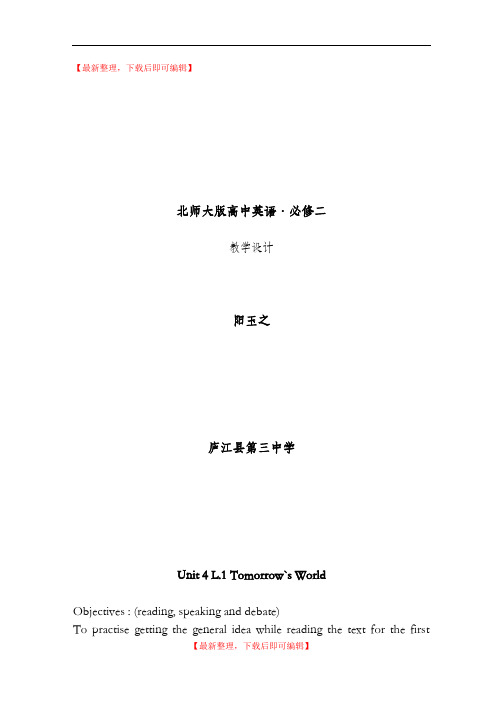
【最新整理,下载后即可编辑】北师大版高中英语·必修二教学设计阳玉之庐江县第三中学Unit 4 L.1 Tomorrow`s WorldObjectives : (reading, speaking and debate)To practise getting the general idea while reading the text for the firsttime.To use the title of a text to predict the content.To develop strategies to match topics with paragraphs.To identify important words in a text.To debate on students` opinions of cyberspace. ( optimistic or pessimistic)To write an article about their opinions of cyberspace.ReadingStep 1 Warm-upAs a class, students answer the question "Compared to 10 years ago, how do you think the technology has changed our lives?"The teacher will give the example first to start students` thinking, e.g.Ten years ago our cellphones were big and only for calls but now they become smaller and multi-functional.Students would surely mention the computer. And the teacher then guides the students to the topic : The Future of Cyberspace.Step 2 PredictionAsk students how useful it is to read the title of a text or a newspaper headline. In pairs , students discuss which topic will be mentioned in this text. Ask students if they would be mentioned any other topics if they were writing the article.Step 3 Extensive reading and getting the general idea.Match topics with paragraphsStudents read the text on the screen quickly and check their guesses. ( the time limit on the screen can train students` ability of fast reading and getting key words)Answers: the Internet virtual realityAt the same time students match topics with paragraphs.( exercises will be presented in the material.)Step 4 Words GuessingIn order to train students` ability of guessing meanings of newwords, the teacher will ask students to read out the sentences in the text containing the key words and then substitute the definition in the sentence. ( more practice will be done in the homework paper.)Step 5 Intensive ReadingStudents read the text again, finding the details of optimistic opinions and pessimistic opinions.Step 6 DebateStudents debate on Cyberspace, using all information they have learnt before.Step 7 Homework and AssessmentStudents will write an article about their opinions of cyberspace. The teacher will evaluate what students have got from the class and students are requested to do a self-assessment.1.Multiple choices.(1).Match the paragraphs with these headings in one minute. (general ideas)A) Pessimistic opinionsB) Seeing the futureC) Optimistic opinionsD) The Internet growth(2).Read the text again and choose the best topic sentence for the passage. (main idea)A) The Internet is good for us.B) The pessimistic opinions about the cyberspaceC) The opinions about the Internet.D) How are the computer and the Net going to affect our lives.(3).According to Peter Anderson, where will we live in the future? (detail information)A) outer spaceB) virtual worldC) virtual houseD) Internet world2. Guess the definitions of the underlined words.(1).Some experts are pessimistic about the Future. One worry is crime in cyberspace.(2).Even now, young hackers can get into the computer of banks and governments.3. SummaryThe article talks about _____________.Different people have different ideas. Someare__________. They worry about the crime, hackers and terrorists in cyberspace. However,many people are__________. They think computer can make our life easier. People canbuy books, ____ticket, etc. Some experts believe that we will live in ____________ in theFuture.4. Open questions.(1)Compared to 10 years ago, how do you think technology has changed our life?(2)What`s your opinion about the cyberspace? Are you pessimistic or optimistic about it? Why? (for debate)Self - assessment1. Do you know when and how to get the general idea? Yes ( ) No( )2. Do you know the structure of this passage? Yes ( ) No( )3. Are you confident to speak in the class? Yes ( ) No( )4. Are you interested in debate? Yes ( ) No( )5. What can you do when you come across new words ? Yes ( ) No( )6. Did you ever make any guessing before you read the passages? Yes ( ) No( )7. Do you like this lesson? Yes ( ) No( )8. What`s your suggestions to the teacher? Yes ( ) No( )Unit 4《Cyberspace》lesson2 Websites Senior High English Book 2Unit 4 Cyberspace Lesson 2 WebsitesⅠ. Preparations Before Class (课前准备)Task 1: Song Enjoying (好歌想听就听)Listen to the song and try to fill in the blanks with the words you hear.Hiding from the rain and snowTrying to forget but I won't let goLooking at a crowded streetListening to my own heart beatSo many people all around the worldTell me where do I find someone like you girlTake me to your heart take me to your soul (重复)Give me your hand before I'm oldShow me what love is - haven't got a clueShow me that wonders can be trueThey say nothing lasts foreverWe're only here todayLove is now or neverBring me far awayTake me to your heart take me to your soulGive me your hand and hold meShow me what love is - be my guiding starIt's easy take me to your heartStanding on a mountain highLooking at the moon through a clear blue skyI should go and see some friendsBut they don't really comprehendDon't need too much talking without saying anythingAll I need is someone who makes me wanna singTask 2: Make a Preparation (听前热身)1. The Pentagon (五角大楼)has sent the military to Iraq and the military action has been taken to deal with the fights there.2. Dr May is a great scientist. She has done a lot of scientific researches into the Internet. Today, she's going to tell us something about the history of the Internet.Predict: Did the Net begin for military reasons or for scientific reasons?Ⅱ. Activities in Class (课堂活动)Task 1: Rewarding time (比一比)Task 2: Have a try (牛刀小试) Tick the words you hear:Manchester University, Britain, Internet, military, America, Pentagon, communications,nuclear war, linking, network, share ideas, entertainment Task 3. Imagine and listen (想一想,听一听) Can you fill in the blanks with the words you hear?In ____________, the Pentagon _____ ___________ ____ communications after a nuclear war. And in 1969 they thought of_________ computers into a network. And then people in universities all over the world began to use the network to __________________. They use it for work and ______________.the 1960s; were worried about; linking; share ideas; for fun Task4. Word learning (词汇学习)1. Do you think Mandy gave some advice / suggested something / made some suggestions to Lucy for the weekend activities?2. Did Lucy accept or reject her suggestions?3. Did they make any arrangements for their weekend?21.(天津卷1). He telephoned the travel agency to_______ three air tickets to London.A. orderB. arrangeC. takeD. book解析:book和tickets搭配,是"订票"的意思。
Unit+6+Topic+Talk+教学设计 高中英语北师大版(2019)必修第二册

Basic InformationTheme:Unit6 The Admirable Topic TalkSubject English Grade Senior One Teacher:Beijing Normal University edition of new textbooks. Module 2 Unit6 Topic TalkMaterial AnalysisThis lesson is the topic introduction of the whole unit, which foreshadows the topic vocabulary for the whole unit .There are two listening texts in this lesson and they are both dialogues between two people. These two texts talk about the people you admire and their qualities. They are someone who have made outstanding contributions to the society under the theme of "Man and society". The theme of the lesson is to help students cultivate good conduct and make contributions to society.Analysis of textbook content[What]In the first set of dialogues, Jenny talks about the man she admires -- her uncle, who is a fireman. Firemen do an important job, not only putting out fires, but also saving the lives of people in danger. The firemen show great courage in the face of danger.In the second set of dialogues, they discuss the common qualities of their admirable people, which include courage, bravery, to fight evil, to work hard and to make lives better.[How]They are both dialogues. The two listening contents are closely related to the following three lessons in terms of topic and language.[Why]The textbook chooses these two dialogues as the topic introduction of the whole unit to provoke students to think about good conduct, correct attitude towards life, civic duty,social responsibility and contribution to society. Karl Marx, Lei Feng, Beethoven and other famous people's quotes are selected for students to learn, which foreshadows the theme and vocabulary of the rest of this unit and inspires students to think.Analysis of studentsBe good at:Students are familiar with the topic of this unit, and they can learn about the life, deeds and achievements of the admired people through reading, and can briefly express their views on admired people.Be weak in:It is slightly difficult for students to infer the good qualities of a respectable person from reading the text and it is hard for them to appreciate some stylistic features.Teaching Objectives1. Listen to the historical contributions of Martin Luther King and Gandhi, and be able to appropriately express who is respected and why.2. Preserve your passion for English learning by writing poems.3. Analyse the good qualities of different respected people, judge which ones are respected and improve analytical and critical thinking.4. Face setbacks in life positively,have the courage to learn from respected people,andform a correct outlook on life and values.Teaching key and difficult points【Key points】1. Students can understand the main idea of the text.2. Students can extract key words from the text.【Difficult Points】1. Students can use theme words to describe people they admire.2. Be able to express their feelings about the respected people. Teaching MethodsCommunicative Approach;Task-based Language Teaching Method;Learning Plan-guided Teaching MethodTeaching DesignTeaching objectivesTeachingproceduresTeaching Activities Purpose TimeGet and sortout the main informationin the listening.Step1Warm-Up1. Who is a person you admire?2. Why do you admire him/her?Set up thesituation,intr-oducethe theme.4minsArousestudents’interest,lead in the topic.Step2Pre-listening1. What are some commoncareers?2. What things do theseprofessionals do?3. What are the qualities ofadmirable people? Learn theUselanguagescaffoldingto expandknowledge6minsexamples of a famous scientist, afamous writer, and a famousentrepreneur.learning. Improvestudents’listening and extract useful information.Step3While-listening1. What are the people in thedialogue talking about?2. Who is an admirable person inJenny’s mind?Guide ss toobtainpreliminaryinformationand lead inthe corecontent.15minsLearnunderstandin g expand knowledge,re flect on life.Step4Post-listeningTalk about quotes from famousadmirable people reflecting theirunderstanding of life.Condensesublimatelanguage,broadenhorizon.5minsCombine the knowledgelearned to improve writing ability.Step5Writing1. Write about an admirableperson in your mind.2. Introduce the outline of anexpository essay.3. Share your writing with theclass.With thehelp of oralexpressions,theexpositorystructure issorted out.5minsConclusionStep6SummaryStudents summarize the wholepassage and teacher makessupplementary if necessary.Help Ssconsolidateinformationandsublimatetheir5minsthoughts.。
北师大版高中英语必修2教学案例.doc
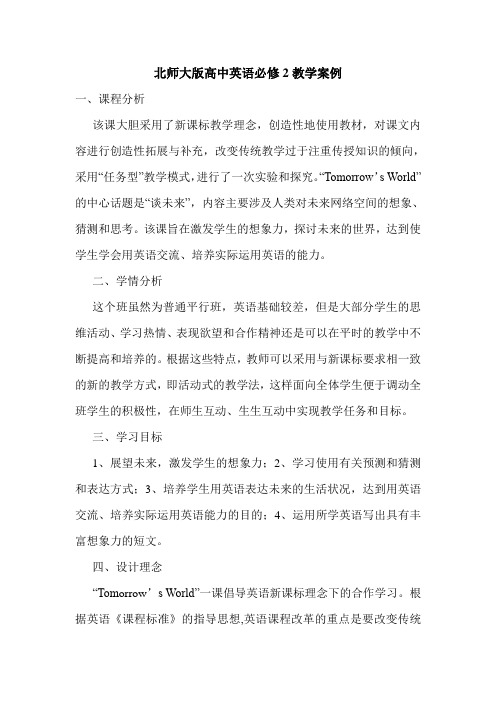
北师大版高中英语必修2教学案例一、课程分析该课大胆采用了新课标教学理念,创造性地使用教材,对课文内容进行创造性拓展与补充,改变传统教学过于注重传授知识的倾向,采用“任务型”教学模式,进行了一次实验和探究。
“Tomorrow’s World”的中心话题是“谈未来”,内容主要涉及人类对未来网络空间的想象、猜测和思考。
该课旨在激发学生的想象力,探讨未来的世界,达到使学生学会用英语交流、培养实际运用英语的能力。
二、学情分析这个班虽然为普通平行班,英语基础较差,但是大部分学生的思维活动、学习热情、表现欲望和合作精神还是可以在平时的教学中不断提高和培养的。
根据这些特点,教师可以采用与新课标要求相一致的新的教学方式,即活动式的教学法,这样面向全体学生便于调动全班学生的积极性,在师生互动、生生互动中实现教学任务和目标。
三、学习目标1、展望未来,激发学生的想象力;2、学习使用有关预测和猜测和表达方式;3、培养学生用英语表达未来的生活状况,达到用英语交流、培养实际运用英语能力的目的;4、运用所学英语写出具有丰富想象力的短文。
四、设计理念“Tom orrow’s World”一课倡导英语新课标理念下的合作学习。
根据英语《课程标准》的指导思想,英语课程改革的重点是要改变传统教学过分重视语法和词汇知识的讲解与传授、即忽视对学生实际语言运用能力的培养的倾向,强调课程从学生的学习兴趣和认知水平出发,倡导学生体验参与、合作与交流的学习方式和“任务型”的教学模式,由学生共同努力来实现教学目标。
教师要引导学生利用所学语言来完成任务,促进学生运用所学外语获取信息,处理信息,使用信息与人交流,让学生去发现问题、设计问题并解决问题,提高合作意识,培养合作精神,从而实现学生的主体地位,发展学生的综合语言运用能力。
五、教学媒体设计指导学生将信息技术与英语学习相整合,教师鼓励学生利用网络资源及多媒体技术积极探索和运用知识。
让学生展开想象,搜集有关资料,制成课件。
新教材北师大版高中英语必修第二册全册精品教学课件(共659页)
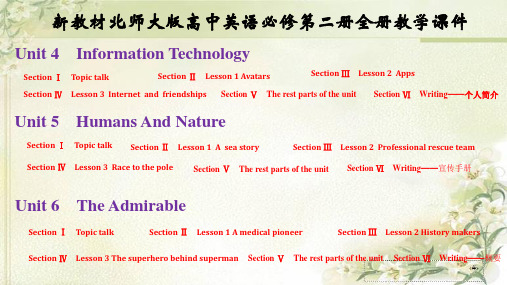
Ⅰ.语言知识积累
关于网上购物的常用口语
1.Do you often shop online? 你经常网上购物吗? 2.Sometimes I surf online shops to check out what they have and then go to a physical store to do the actual shopping. 有时候,我会逛逛网店,看看店里有什么,然后到实体店去买。 3.Can the quality of goods online be guaranteed? 网上商品的质量能有保证吗?
Ⅱ.文化知识习得 地球村
地球村,是说地球虽然很大,但是随着广播、电视、互联网和其它电子媒介的出 现,大家交流就像在一个小村子里面一样便利。
麦克卢汉对现代传播媒介的分析深刻地改变了人们特别是当代青年人对20世纪以及21世纪生活的观念他所预言的地球村在今天的社会已经变成了现实
新教材北师大版高中英语必修第二册全册教学课件
Unit 4 Information Technology
Section Ⅰ Topic talk
Section Ⅱ Lesson 1 Avatars
Section Ⅲ Lesson 2 Apps
Section Ⅳ Lesson 3 Internet and friendships Section Ⅴ The rest parts of the unit Section Ⅵ Writing——个人简介
Unit 5 Humans And Nature
to learn. 在这个科技进步得飞快的世界,你想要活下去,就要不断地学习。 2.If you miss the Internet, you will miss not only the opportunity, but an entire era. 如果错过互联网,与你擦肩而过的不仅是机会,而是整整一个时代。
北师大版高中英语必修2教学案例.doc

北师大版高中英语必修2教学案例一、课程分析该课大胆采用了新课标教学理念,创造性地使用教材,对课文内容进行创造性拓展与补充,改变传统教学过于注重传授知识的倾向,采用“任务型”教学模式,进行了一次实验和探究。
“Tomorrow’s World”的中心话题是“谈未来”,内容主要涉及人类对未来网络空间的想象、猜测和思考。
该课旨在激发学生的想象力,探讨未来的世界,达到使学生学会用英语交流、培养实际运用英语的能力。
二、学情分析这个班虽然为普通平行班,英语基础较差,但是大部分学生的思维活动、学习热情、表现欲望和合作精神还是可以在平时的教学中不断提高和培养的。
根据这些特点,教师可以采用与新课标要求相一致的新的教学方式,即活动式的教学法,这样面向全体学生便于调动全班学生的积极性,在师生互动、生生互动中实现教学任务和目标。
三、学习目标1、展望未来,激发学生的想象力;2、学习使用有关预测和猜测和表达方式;3、培养学生用英语表达未来的生活状况,达到用英语交流、培养实际运用英语能力的目的;4、运用所学英语写出具有丰富想象力的短文。
四、设计理念“Tom orrow’s World”一课倡导英语新课标理念下的合作学习。
根据英语《课程标准》的指导思想,英语课程改革的重点是要改变传统教学过分重视语法和词汇知识的讲解与传授、即忽视对学生实际语言运用能力的培养的倾向,强调课程从学生的学习兴趣和认知水平出发,倡导学生体验参与、合作与交流的学习方式和“任务型”的教学模式,由学生共同努力来实现教学目标。
教师要引导学生利用所学语言来完成任务,促进学生运用所学外语获取信息,处理信息,使用信息与人交流,让学生去发现问题、设计问题并解决问题,提高合作意识,培养合作精神,从而实现学生的主体地位,发展学生的综合语言运用能力。
五、教学媒体设计指导学生将信息技术与英语学习相整合,教师鼓励学生利用网络资源及多媒体技术积极探索和运用知识。
让学生展开想象,搜集有关资料,制成课件。
北师大版高中英语必修二教学案全套
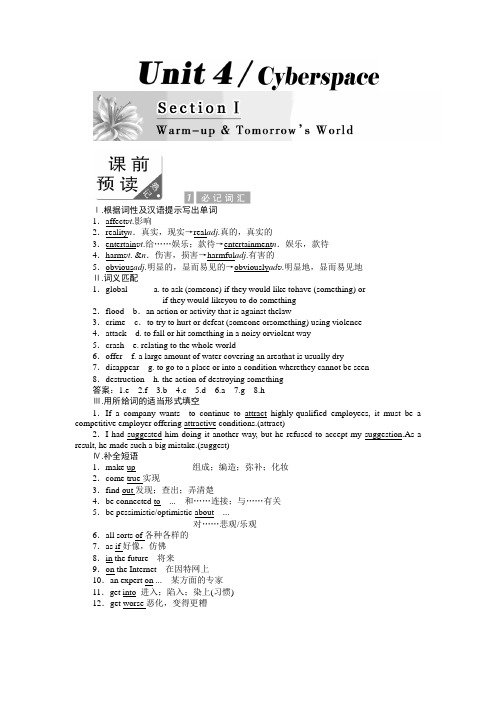
Ⅰ.根据词性及汉语提示写出单词1.affect v t.影响2.reality n.真实,现实→real adj.真的,真实的3.entertain v t.给……娱乐;款待→entertainment n.娱乐,款待4.harm v t. &n.伤害,损害→harmful adj.有害的5.obvious adj.明显的,显而易见的→obviously ad v.明显地,显而易见地Ⅱ.词义匹配1.global a. to ask (someone) if they would like tohave (something) orif they would likeyou to do something2.flood b.an action or activity that is against thelaw3.crime c.to try to hurt or defeat (someone orsomething) using violence4.attack d. to fall or hit something in a noisy orviolent way5.crash e. relating to the whole world6.offer f. a large amount of water covering an areathat is usually dry7.disappear g. to go to a place or into a condition wherethey cannot be seen8.destruction h. the action of destroying something答案:1.e 2.f 3.b 4.c 5.d 6.a7.g8.hⅢ.用所给词的适当形式填空1.If a company wants to continue to attract highly-qualified employees, it must be a competitive employer offering attractive conditions.(attract)2.I had suggested him doing it another way, but he refused to accept my suggestion.As a result, he made such a big mistake.(suggest)Ⅳ.补全短语1.make up组成;编造;弥补;化妆2.come true实现3.find out发现;查出;弄清楚4.be connected to ... 和……连接;与……有关5.be pessimistic/optimistic about ...对……悲观/乐观6.all sorts of各种各样的7.as if好像,仿佛8.in the future 将来9.on the Internet 在因特网上10.an expert on ... 某方面的专家11.get into 进入;陷入;染上(习惯)12.get worse恶化,变得更糟1.In the last thirty years, the Internet has grown rapidly.在过去的三十年里,网络已经迅速地发展起来。
北师大版高中英语必修二教案
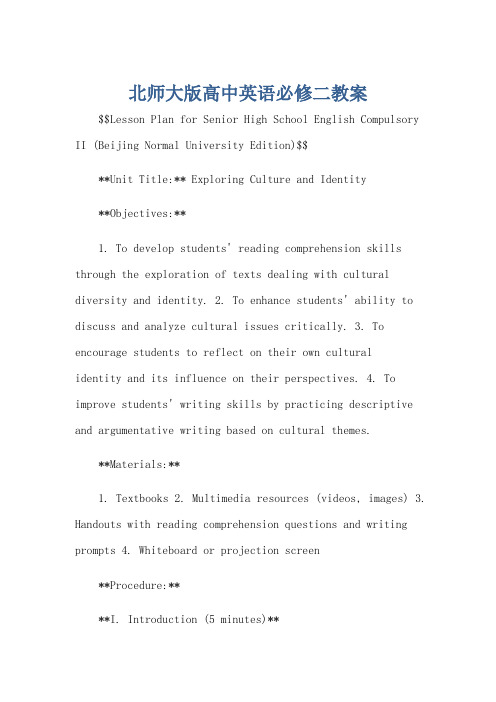
北师大版高中英语必修二教案$$Lesson Plan for Senior High School English Compulsory II (Beijing Normal University Edition)$$**Unit Title:** Exploring Culture and Identity**Objectives:**1. To develop students' reading comprehension skills through the exploration of texts dealing with cultural diversity and identity.2. To enhance students' ability to discuss and analyze cultural issues critically.3. To encourage students to reflect on their own culturalidentity and its influence on their perspectives. 4. To improve students' writing skills by practicing descriptive and argumentative writing based on cultural themes.**Materials:**1. Textbooks2. Multimedia resources (videos, images)3. Handouts with reading comprehension questions and writing prompts4. Whiteboard or projection screen**Procedure:****I. Introduction (5 minutes)**1. Begin the lesson by greeting students and asking them to brainstorm ideas about the concept of "culture" and "identity."2. Discuss their responses, emphasizing the diverse nature of cultures and how identity is shaped by cultural backgrounds.**II. Reading Comprehension (15 minutes)**1. Introduce the main text of the unit, focusing on a cultural issue or a story that explores identity.2. Ask students to read the text silently, noting down any unfamiliar vocabulary or phrases.3. Provide definitions or examples for the new vocabulary, and encourage students to guess meanings from context.4. Discuss the main points and themes of the text, asking students to identify key ideas and examples.5. Administer a reading comprehension quiz with multiple-choice or true/false questions to assess understanding.**III. Critical Analysis (10 minutes)**1. Divide students into small groups and ask them to discuss the following questions: - How does the text reflect the cultural norms and values of the society it portrays? - How do the characters' identities shapetheir experiences and perspectives? - What are the similarities and differences between the cultures described in the text and your own culture? 2. Each group presents their findings to the class, and a class discussion follows to explore different viewpoints.**IV. Multimedia Enhancement (5 minutes)**1. Show a video clip or a series of images that illustrate different cultural practices or traditions.2. Ask students to identify the cultural elements present in the multimedia material and discuss their significance.3. Connect the multimedia content to the reading text, highlighting common themes or contrasting perspectives.**V. Writing Activity (15 minutes)**1. Provide students with a writing prompt related to the cultural theme of the unit. For example: - Write a descriptive essay about a cultural event or festival you have attended. - Compose an argumentative essay discussing the importance of preserving cultural heritage.2. Students write individually, encouraged to use the language and ideas from the reading text as well as theirown observations and experiences. 3. Provide guidance on essay structure, language use, and effective argumentation. **VI. Conclusion and Homework (5 minutes)**1. Conclude the lesson by summarizing the main points covered and emphasizing the importance of understanding and respecting cultural diversity.2. Assign homework: ask students to revise and finalize their essays, ready for peer review or teacher feedback in the next class.**Evaluation:**1. Evaluate students' comprehension of the reading text through the reading comprehension quiz.2. Assess their participation in group discussions and their ability to analyze and discuss cultural issues critically.3. Grade their writing assignment based on content, organization, language use, and the effectiveness of their arguments.**Reflection:**After the lesson, teachers should reflect on the effectiveness of the activities and whether students were engaged and challenged appropriately. Considerations for future lessons could include incorporating more interactiveactivities, providing more scaffolding for writing tasks, or exploring different cultural topics to maintain student interest.。
- 1、下载文档前请自行甄别文档内容的完整性,平台不提供额外的编辑、内容补充、找答案等附加服务。
- 2、"仅部分预览"的文档,不可在线预览部分如存在完整性等问题,可反馈申请退款(可完整预览的文档不适用该条件!)。
- 3、如文档侵犯您的权益,请联系客服反馈,我们会尽快为您处理(人工客服工作时间:9:00-18:30)。
北师大版高中英语·必修二教学设计阳玉之庐江县第三中学Unit 4 L.1 Tomorrow`s WorldObjectives : (reading, speaking and debate)To practise getting the general idea while reading the text for the first time.To use the title of a text to predict the content.To develop strategies to match topics with paragraphs.To identify important words in a text.To debate on students` opinions of cyberspace. ( optimistic or pessimistic)To write an article about their opinions of cyberspace.ReadingStep 1 Warm-upAs a class, students answer the question "Compared to 10 years ago, how do you think the technology has changed our lives?"The teacher will give the example first to start students` thinking, e.g.Ten years ago our cellphones were big and only for calls but now they become smaller and multi-functional.Students would surely mention the computer. And the teacher then guides the students to the topic : The Future of Cyberspace.Step 2 PredictionAsk students how useful it is to read the title of a text or a newspaper headline. In pairs , students discuss which topic will be mentioned in this text. Ask students if they would be mentioned any other topics if they were writing the article.Step 3 Extensive reading and getting the general idea.Match topics with paragraphsStudents read the text on the screen quickly and check their guesses.( the time limit on the screen can train students` ability of fast reading and getting key words)Answers: the Internet virtual realityAt the same time students match topics with paragraphs.( exercises will be presented in the material.)Step 4 Words GuessingIn order to train students` ability of guessing meanings of new words, the teacher will ask students to read out the sentences in the text containing the key words and then substitute the definition in the sentence. ( more practice will be done in the homework paper.)Step 5 Intensive ReadingStudents read the text again, finding the details of optimistic opinions and pessimistic opinions.Step 6 DebateStudents debate on Cyberspace, using all information they have learnt before. Step 7 Homework and AssessmentStudents will write an article about their opinions of cyberspace. The teacher will evaluate what students have got from the class and students are requested to do aself-assessment.1.Multiple choices.(1).Match the paragraphs with these headings in one minute. (general ideas)A) Pessimistic opinionsB) Seeing the futureC) Optimistic opinionsD) The Internet growth(2).Read the text again and choose the best topic sentence for the passage. (main idea)A) The Internet is good for us.B) The pessimistic opinions about the cyberspaceC) The opinions about the Internet.D) How are the computer and the Net going to affect our lives.(3).According to Peter Anderson, where will we live in the future? (detail information)A) outer spaceB) virtual worldC) virtual houseD) Internet world2. Guess the definitions of the underlined words.(1).Some experts are pessimistic about the Future. One worry is crime in cyberspace.(2).Even now, young hackers can get into the computer of banks and governments.3. SummaryThe article talks about _____________.Different people have different ideas. Someare__________. They worry about the crime, hackers and terrorists in cyberspace. However,many people are__________. They think computer can make our life easier. People can buy books, ____ticket, etc. Some experts believe that we will live in ____________ in theFuture.4. Open questions.(1)Compared to 10 years ago, how do you think technology has changed our life?(2)What`s your opinion about the cyberspace? Are you pessimistic or optimistic about it? Why? (for debate)Self - assessment1. Do you know when and how to get the general idea? Yes ( ) No( )2. Do you know the structure of this passage? Yes ( ) No( )3. Are you confident to speak in the class? Yes ( ) No( )4. Are you interested in debate? Yes ( ) No( )5. What can you do when you come across new words ? Yes ( ) No( )6. Did you ever make any guessing before you read the passages? Yes ( ) No( )7. Do you like this lesson? Yes ( ) No( )8. What`s your suggestions to the teacher? Yes ( ) No( )Unit 4《Cyberspace》lesson2 WebsitesSenior High English Book 2Unit 4 Cyberspace Lesson 2 WebsitesⅠ. Preparations Before Class (课前准备)Task 1: Song Enjoying (好歌想听就听)Listen to the song and try to fill in the blanks with the words you hear.Hiding from the rain and snowTrying to forget but I won't let goLooking at a crowded streetListening to my own heart beatSo many people all around the worldTell me where do I find someone like you girlTake me to your heart take me to your soul (重复)Give me your hand before I'm oldShow me what love is - haven't got a clueShow me that wonders can be trueThey say nothing lasts foreverWe're only here todayLove is now or neverBring me far awayTake me to your heart take me to your soulGive me your hand and hold meShow me what love is - be my guiding starIt's easy take me to your heartStanding on a mountain highLooking at the moon through a clear blue skyI should go and see some friendsBut they don't really comprehendDon't need too much talking without saying anythingAll I need is someone who makes me wanna singTask 2: Make a Preparation (听前热身)1. The Pentagon (五角大楼)has sent the military to Iraq and the military action has been taken to deal with the fights there.2. Dr May is a great scientist. She has done a lot of scientific researches into the Internet. Today, she's going to tell us something about the history of the Internet.Predict: Did the Net begin for military reasons or for scientific reasons?Ⅱ. Activities in Class (课堂活动)Task 1: Rewarding time (比一比)Task 2: Have a try (牛刀小试) Tick the words you hear:Manchester University, Britain, Internet, military, America, Pentagon, communications,nuclear war, linking, network, share ideas, entertainmentTask 3. Imagine and listen (想一想,听一听) Can you fill in the blanks with the words you hear?In ____________, the Pentagon _____ ___________ ____ communications after a nuclear war. And in 1969 they thought of _________ computers into a network. And then people in universities all over the world began to use the network to__________________. They use it for work and ______________.the 1960s; were worried about; linking; share ideas; for fun Task4. Word learning (词汇学习)1. Do you think Mandy gave some advice / suggested something / made some suggestions to Lucy for the weekend activities?2. Did Lucy accept or reject her suggestions?3. Did they make any arrangements for their weekend?21.(天津卷1). He telephoned the travel agency to_______ three air tickets to London.A. orderB. arrangeC. takeD. book解析:book和tickets搭配,是"订票"的意思。
